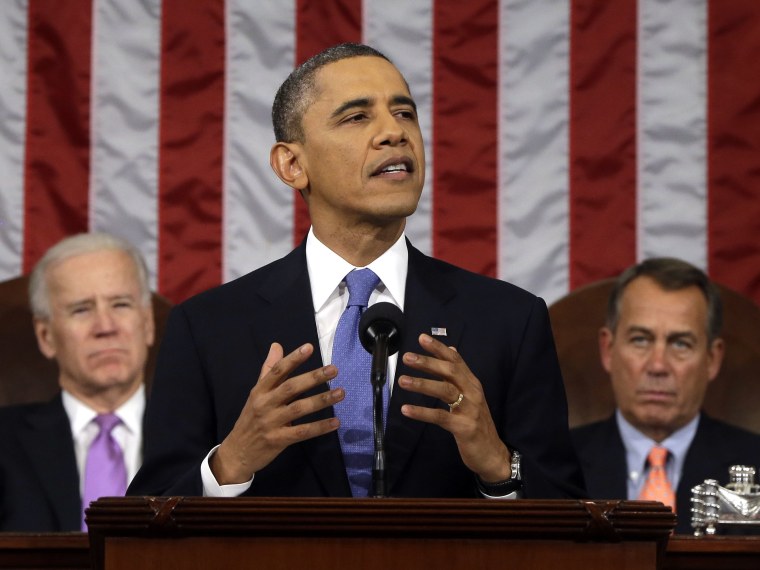The pundits are now parsing President Obama’s State of the Union to calculate its impact onupcoming battles over the budget, gun safety and immigration. But their focus is too narrow.Their time horizon is too short. Something much bigger is afoot.
There’s a riptide running in American politics, and as the President signaled in the passionateperoration of his State of the Union Address and his “We the People” mantra in his Inaugural, heis out to ignite a populist crusade that will turn the tides of power in Washington.
As boaters and fishermen know, riptides mark a powerful moment of change. The waters swirlchaotically. But riptides are pregnant with future potential. The surface current flow one way —in the old direction. But in the depths below, larger and more powerful currents are running inthe opposite direction – a new direction.
Since 2010 the strongest current has been the radical anti-government, anti-tax tide of the TeaParty that have tied Washington in gridlock and brought government to a halt. So dominant wasthe Tea Party tide just a year that Republican leaders – echoed by many commentators – wereconfidently predicting that the GOP would win the White House and control of the Senate.
Counter currents emerged in last year’s elections. Obama won a surprisingly convincing re-election and the Democrats not only kept their Senate majority but added two seats. In Houseelections, too, Democrats actually won more popular votes nationwide than Republicans. Onlythe stark gerrymandering of congressional districts gave Republicans a 33-vote House majority.
Now, American history, which moves in long cycles, may be on Obama’s side. Every 30 or 40years, the pendulum of American politics swings from an era of conservatism to progressivismor vice versa, and our current conservative era, which is 35 years old, shows signs of tiring.
The pendulum swings go back back in our history. The conservative Roaring Twenties gaveway to the liberalism of Franklin Delano Roosevelt’s New Deal in 1933, which launched a longprogressive era of governmental activism, expanding the social safety net and regulating theexcesses of American capitalism. This era extended through the 1950s and ’60s and intothe ’70s, with mass movements for civil rights, consumer rights, labor rights, women’s rights andenvironmental protections pushing Washington to expand government, even under RepublicanPresident Richard Nixon.
But the tide turned in 1978. Paradoxically, the new conservative era, our era emerged whenDemocrats under the Democrats. They controlled Congress and the White House but facedintensive pressures from a newly awakened and organized army of business lobbies. Underpresidents from Jimmy Carter and Ronald Reagan to George W. Bush, government wascaptured by the political forces of business. Congress has cut taxes, rolled back governmentregulations and delivered many concessions to Wall Street banks and Corporate America.
Responding to Obama’s State of the Union, Tea Party republicans showed they are dug in formore partisan warfare. But out in the country, state Republican leaders like Governor BobbyJindal of Louisiana worry that the GOP is facing an ebb tide.
In the 2012 elections, Republican did badly among minority voters and women, who representgrowing segments of the electorate. The GOP did best among older white men, a shrinking sliceof the population. As former GOP National Chairman HAley Barbour warned: “The demographicchanges in America are real, and they are a wake-up call for the Republican Party.”
On policy, too, the undercurrents have been shifting. Obama’s health care reform may remaincontroversial but it is the first major expansion of the federal safety net written into law sinceMedicare in 1965. Obama’s successful push to raise taxes on in the super-rich last month is thefirst time in decades that Washington has targeted the top 1 percent. The Consumer FinancialProtection Bureau set up under the 2010 bank regulatory reform is the first strong consumermeasure since the 1970s.
But the move with the most far-reaching potential for a long-term change in American politics,was Obama’s inaugural call for a populist political crusade, his powerful mantra: “We thePeople. … We the People … must act now,” echoed now in his barnstorming from NorthCarolina and Atlanta to Chicago for his middle class agenda.
The president is not just out to pass a few bills. He is out to alter the balance of power inWashington, where for 35 years Congress and the White House have been largely doing thebidding of business and special-interest lobbyists. Obama’s gambit is to turn the tide by revivingthe people power of the 1950s, ’60s and ’70s.
Last fall, Obama signaled that his second term would be different. “You can’t changeWashington from the inside. You can only change it from the outside,” he declared. “Changehappens because the American people demand it, because they rise up and insist on new ideasand new leadership, a new politics for a new time.”
Few took Obama seriously back then, but in his Inaugural and his State of the Union, thepresident has laid down his marker. He has gone beyond rhetoric by committing his potentcampaign apparatus, led by Jim Messina, to the goal of converting Middle America’s discontentinto political power. Already, Barack and Michelle Obama are bombarding their army of politicalfollowers with emails, cellphone videos, and tweets urging them to join an activist cause.
This strategy is a major gamble, given the political inertia among average Americans. But ifObama can actually stir up a grass-roots populist crusade - and that remains a big if - theimpact will go far beyond passing several bills in Congress. The rebirth of populist activism outin the country could transform the landscape of power in Washington. Like a swirling rip-tide, itcould thrust America into a new progressive e
Hedrick Smith is former Washington bureau chief of The New York Times and author of “Who Stole the American Dream?”

